|
|
|
Sort Order |
|
|
|
Items / Page
|
|
|
|
|
|
|
| Srl | Item |
| 1 |
ID:
139283
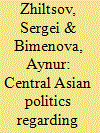

|
|
|
|
|
| Summary/Abstract |
This article analyzes the situation regarding the water resources of the transboundary rivers that developed in Central Asia after the collapse of the Soviet Union when the previous mechanism of mutual account of the interests of all the Central Asian republics broke down. Particular attention is given to studying the factors that have an impact on the formation and implementation of Central Asian politics regarding water use. A comparison is made of the international legal base that regulates conflicts involving the water resources of transboundary rivers and the legal documents of the Central Asian states. The paper analyzes the reasons for the failure to create a multisided mechanism for resolving the disputes that arise among the Central Asian countries with respect to water use of the transboundary rivers.
|
|
|
|
|
|
|
|
|
|
|
|
|
|
|
|
| 2 |
ID:
127771
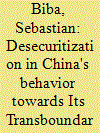

|
|
|
|
|
| Publication |
2014.
|
| Summary/Abstract |
Fresh water has no substitute, and its availability has been declining sharply around the globe. In Asia, China's role as a multidirectional and transborder water provider is unmatched. Analysis of China's behavior towards its transboundary rivers is therefore pivotal. By examining three different case studies-the Mekong River in Southeast Asia, the Brahmaputra River in South Asia and the Irtysh and Ili Rivers in Central Asia-this article seeks to lay the theoretical groundwork for understanding China's behavior. It pits previously applied realist rationales against the more recent notion of desecuritization strategies and makes a case for the latter. While desecuritization implies non- or de-escalation, it does not necessarily mean genuine long-term cooperation. The future of Asia's shared waters may thus be a contentious one.
|
|
|
|
|
|
|
|
|
|
|
|
|
|
|
|
| 3 |
ID:
143566
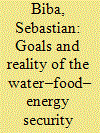

|
|
|
|
|
| Summary/Abstract |
The so-called ‘nexus’ approach has recently been promoted as addressing externalities across the water, food and energy sectors, thus helping to achieve ‘water/energy/food security for all’, ‘equitable and sustainable growth’ and a ‘resilient and productive environment’. While these are noble goals, this article argues that the reality on the ground appears to be taking a different direction, at least when it comes to China and its neighbours in South and Southeast Asia. There, a new era of large-scale water infrastructure development is creating several security-related problems, which represent serious challenges to the nexus goals. These challenges include food–energy tensions, human security threats and ecological risks. These challenges can also be linked to rising friction surrounding the management of water, food and energy resources in the region. The article argues that, in order for the nexus goals to be achieved in China and the countries on its southern periphery, there must first be increased awareness of this nexus among policy-making elites.
|
|
|
|
|
|
|
|
|
|
|
|
|
|
|
|
| 4 |
ID:
113788
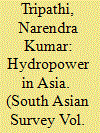

|
|
|
|
|
| Publication |
2010.
|
| Summary/Abstract |
The article seeks to put forward a dynamic conception of construction of issues and their resolution, largely falling under the theoretical rubric of constructivism. The hydropower issues on the Asian continent pertaining to transboundary rivers construct a dynamic binary of dependence and interdependence. Instead of being permanently resolved, as suggested by epistemic community proponents, the issues follow a Hegelian dialectical ontology of problem to solution leading to a new problem. The organisation of the article, built around two foci, India and China, is elliptical. Both countries share transboundary rivers with a number of countries. Most bilateral agreements are, when signed, hailed as the dawn of a new era, before themselves becoming contentious, spawning a new cycle of accusations and counter-accusations. River water issues generate a complex binary of dependence and interdependence, played along the intersection of domestic and international.
|
|
|
|
|
|
|
|
|
|
|
|
|
|
|
|
| 5 |
ID:
107925


|
|
|
|
|
| Publication |
2011.
|
| Summary/Abstract |
International agreements governing rivers vary considerably in whether they contain institutional provisions for joint monitoring, conflict resolution, enforcement, and/or the delegation of authority to intergovernmental organizations. This article develops an explanation for why some river management treaties include more institutional provisions while others contain fewer, if any. The authors argue that certain types of issues related to river use-water quantity, water quality, and navigation-tend to be difficult to manage and prone to noncompliance. When forming treaties to address these specific issues, states will be more likely to include institutional provisions. The authors test the link between these river use issues and institutional design using a data set of 315 river treaties signed since 1950. The results show that highly contentious issues-and in particular water quantity and navigation-have a greater effect on the institutional design of river treaties than contextual and power politics factors.
|
|
|
|
|
|
|
|
|
|
|
|
|
|
|
|
| 6 |
ID:
186389
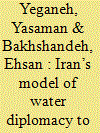

|
|
|
|
|
| Summary/Abstract |
Many countries of the world are suffering from the adverse consequences of water scarcity. The United Nations has estimated that, by the middle of the present century, about 7 billion people in 48 countries, mostly from Southwest Asia, will encounter water scarcity. This may be expedited by the adverse consequences of climate change and global warming which would escalate the risk of war and conflict over transboundary resources. The present research explores the ways water diplomacy can mitigate the dire effects of water scarcity and promote “treaty making” and “institution building” as well as multilateral cooperation on shared waters. The focus is on Iran's water diplomacy with neighboring countries over transboundary resources to forge cooperation and hamper conflict. Our findings suggest that Iran's water diplomacy is constructed on principles of “goodwill and cooperation,” “non-significant harm,” “environmental protection,” and “exchange of data and information” on shared water resources with its neighboring riparian states. Such a model, which has resulted in no dispute between Iran and some of its neighbors such as Pakistan, Turkmenistan, and Armenia in recent years, demonstrates the broader benefits of Iran's approach to water diplomacy and paves the way for stronger cooperation in other areas of mutual interest. Additionally, it encourages multilateral engagement and “hydrosolidarity” within the framework of agreements and the formation of joint “water commissions” for the equitable and reasonable distribution of water among riparian states in line with the 1997 UN Watercourses Convention.
|
|
|
|
|
|
|
|
|
|
|
|
|
|
|
|
| 7 |
ID:
088934
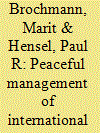

|
|
|
|
|
| Publication |
2009.
|
| Summary/Abstract |
As global water scarcity increases, both scholars and leaders have suggested that water will be a leading cause of future armed conflict. Yet other scholars argue that states typically cooperate rather than fight to manage their shared water resources. We address these arguments by examining the management of internationally shared rivers in the Americas, Western Europe, and the Middle East from 1900-2001. We propose hypotheses on the factors that lead states to become involved in disagreements over shared rivers as well as the factors that lead them to negotiate over these disagreements. Heckman probit analysis suggests that water scarcity - found by past work to be an important influence on armed conflict over rivers - is also an important influence on peaceful efforts to settle river problems; river claims are more likely where water supply is lower and demand is greater, but negotiations are also generally more likely in these same situations. Furthermore, while the existence of river treaties does not prevent the emergence of river claims, the presence of at least one treaty over the specific subject of the claim provides an important starting point that greatly increases the likelihood of negotiations over such claims. We conclude that the more pessimistic views of water management are missing an important part of the story. States are much more likely to negotiate in the most dangerous situations, and institutionalization of river resources can make an important contribution to negotiations over any disagreements that do emerge.
|
|
|
|
|
|
|
|
|
|
|
|
|
|
|
|
| 8 |
ID:
172563
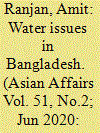

|
|
|
|
|
| Summary/Abstract |
At present, Bangladesh is self-sufficient in water. However, this self-sufficiency is by no means assured. Bangladesh's supplies of water are under threat through a combination of population growth, climate change, and pollution, sometimes caused by mismanagement. This article looks at the state of surface and ground waters in Bangladesh. It discusses the growing demand for water, pollution of the water bodies, and encroachment on the riverbeds, and the way in which this has been dealt with by Bangladesh's authorities. It argues that if things remain business-as-usual, it will become difficult for Bangladesh to continue with its high growth rate over the long term.
|
|
|
|
|
|
|
|
|
|
|
|
|
|
|
|
| 9 |
ID:
115237
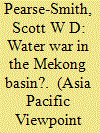

|
|
|
|
|
| Publication |
2012.
|
| Summary/Abstract |
The Mekong River system provides a crucial source of natural resources for riparian nations. However, the increasingly rapid pace of hydro-development in the Mekong Basin is threatening the integrity of the river system, posing a real concern for Lower Basin states, which are particularly dependent on the basin. This scenario has led to warnings of armed conflict, or even 'water war', between riparian states. Certainly, the expanding scale of hydro-development can be expected to continue increasing interstate tensions in the Mekong region; but are these tensions really likely to escalate to armed conflict? This paper explores this question by drawing on the water and conflict theory of Aaron Wolf. Ultimately, this paper concludes that interstate tensions over Mekong hydro-development are unlikely to generate armed conflict. This is in part due to the strategic impracticality of such a conflict as well as the presence of a river basin management institution. Most compellingly, though, armed conflict is unlikely because the economic imperative shared by Mekong states is better served by cooperation - or at least non-interference - than conflict, over regional hydro-development. In closing, the paper urges that the study of water and conflict in the Mekong Basin be refocused at the intrastate level.
|
|
|
|
|
|
|
|
|
|
|
|
|
|
|
|
|
|
|
|
|